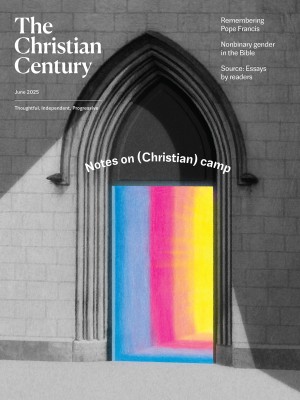One of my peak high school memories is making it into the regional chorus and rehearsing and performing with hundreds of other students. The pieces we sang included an arrangement of the spiritual “Hold On.” I have a sense memory of the words cascading from high notes to low, of the breath required to support them on the way down: “Keep your hand on the plow; hold on, hold on.” The conductor’s animated gestures and intense energy drove the beat and engaged the commitment of the choir. The version we sang all those years ago, still in my bones, expressed the intensity I feel in Jesus’ response to his current and potential disciples in Luke 9. Don’t show up unprepared or halfhearted; hold on. Set your face in the direction you are going; hold on. Don’t look back. Hold on!
While working on this essay, I took a break to search the internet for the arrangement I remember. There are many versions out there, but I could not find the one playing in my mind. Surely there was something in the music of my memory to which I needed to attend. As I stopped writing in favor of listening to choral recordings of all kinds, sorting through my own inspirations, my search grew to be like the one who says, “I will follow you, Lord, but let me first say farewell to those at my home.” The one who, in Jesus’ words, “puts a hand to the plow and looks back.”
Read our latest issue or browse back issues.
In my memory of the regional chorus, at the edge of my rumination, stands a classmate and fellow chorister, a White girl like me, who complained about singing spirituals, lip curling as she expressed her prejudice. I wondered how this music did not enter her and point her in a different direction, change her mind about what was beautiful and true. Like James and John, I longed to rain fire down on her, but in the moment I offered only a rebuke about her taste, not about the racism implicit in her snide remarks.
How often do we simply miss the point? Following Jesus may not—almost always will not—include space and time to check in on other matters such as family or social expectations, or allow for comforts along the way, or even set up the righteous and deserved punishment of his (or our) enemies. Following Jesus is not something to do later. It’s something to do now. Following Jesus means deprioritizing our personal hopes, letting go of our irritations, and moving past our perceived limitations. All these things distract us from keeping our hand on the plow.
Jesus, face set toward Jerusalem, knows his human road will come to an end. The crisis point is coming; he can see the eventualities. The people meeting him along the way perhaps imagine an adventure beginning, with plenty of time to become engaged, or settle affairs at home, or make sure they have a backpack of snacks and a bedroll; surely they have enough time to watch one more choir video on YouTube before getting back to work.
Most of my life has been lived in times I perceived that way. I didn’t go to seminary until my mother was dead! Explaining why I wanted to go, that I felt called by God, proved complicated. She asked, “Why can’t you wait until the children are in school?” I was eager, but I didn’t see the situation as urgent. We can all find reasons to delay, to wait, to see how things turn out later.
That does not feel true now. When I imagine myself in a conversation with Jesus like the ones those hopeful and hoped-for followers had, I try to peel away the excuses I want to make about why I don’t have the capacity for the work, why this is not the time, why surely I can do this one last piece of research before I act.
I still can’t find the final chord I remember for “Hold On.” The closest I can come is an arrangement by Jester Hairston. In my memory the chorus resolves into a major key, the last soprano note ascending, but this is not what I hear in any of the recordings I have found. I keep holding on to the hope that the end will be melodic, harmonic, bright and beautiful. The tension of a mournful resolution pushes me to stop searching my mind and move out on the road with Jesus.
We need—I need—to come down to the reality of the dusty road. The moment is now. The needs are practical and imperative. The hopes are equal parts heavenly and unlikely as we face what may be the end of a long arc bending toward justice, the arc instead broken and redirected. What is Jesus asking of me? Of all of us? Keep your hand on the plow, and hold on.





